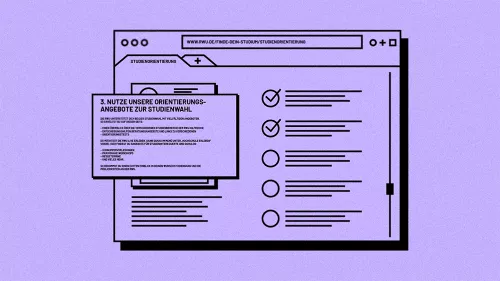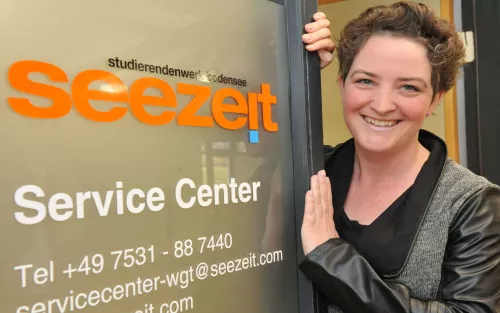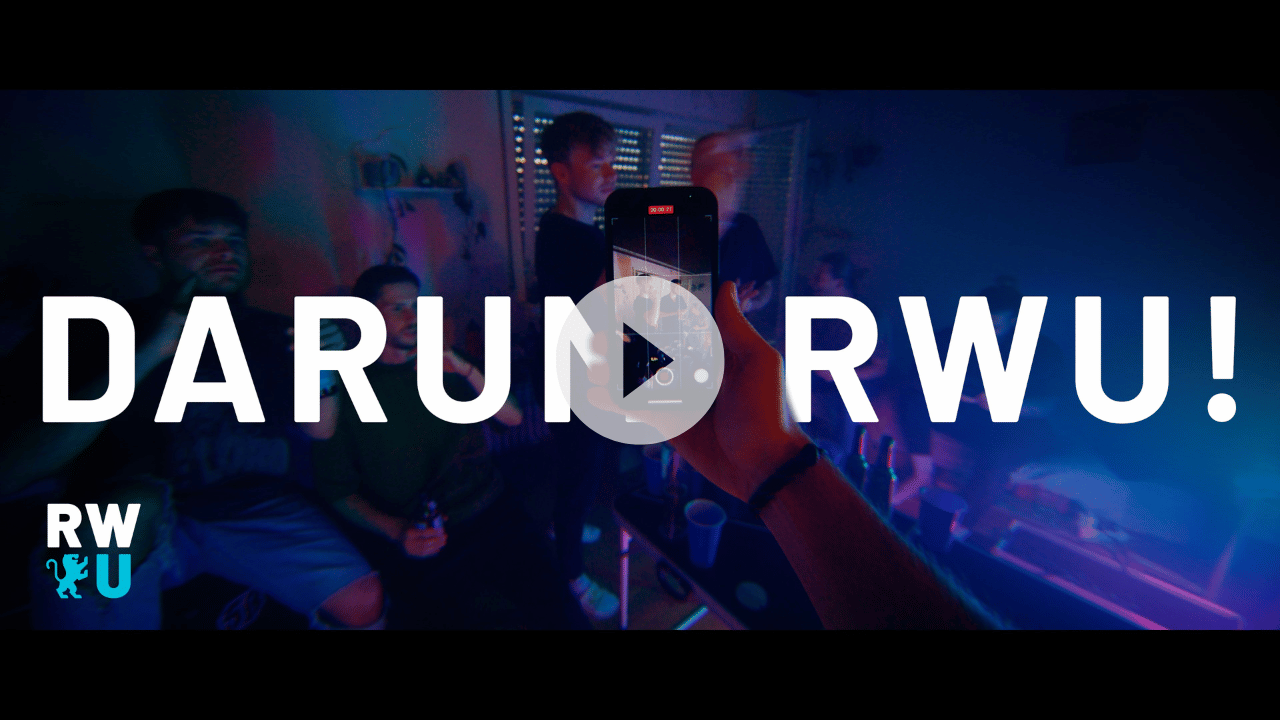First steps
Step by step to the right academic program
What should I study? Is Social Work right for me or something more technical? A University of Applied Sciences or University? Big city or a university in the countryside? Many questions arise when looking for the right degree program. Choosing the right degree program is a big step for your professional future and doesn't happen overnight.
But don't worry: we will guide you step by step on the way to finding the right academic program and offer you valuable tips, tools and personal advice.

1. Career and study choice: What are you really interested in?
It's best to start thinking about your career prospects a few months before you leave school. This will help you avoid stress and free your mind to concentrate fully on your professional future without the pressure of exams. But how do you find the right degree program?
Are there any subjects at school that you particularly enjoy or enjoyed? Or are you interested in a particular subject such as business, technology or social work? Or do you already have a specific career in mind and are looking for the right degree program?
If you are still unsure, our Central Student Advisory Office will be happy to support you with helpful tips on making a decision or a personal guidance.

2. Type of university & place of study: What suits you?
After choosing a subject area, you should consider which type of university suits you best and in which city you would like to study. Would you like to study at a University of Applied Sciences such as RWU with a practical orientation and personal advice, or do you feel more comfortable at a University in a big city? Find out about the differences in teaching methods, curriculum, practical component and campus life to make an informed decision. Choose the path that best suits your goals, learning preferences and personal ideas.

3. Take advantage of our orientation offers for choosing an academic program
RWU supports you in your choice of studies with a wide range of offers.
On this page you will find
- an overview of the various fields of study at RWU
- Helpful decision-making aids
- advice services and links to various orientation tests
Would you like to experience RWU live? Then take a look at the menu under “Experience the University.” Here you will find offers for prospective students and schools:
- taster lectures
- practical workshops
- trade fair dates
- and much more...
This will give you a real insight into your desired degree program and the opportunities at RWU.

4. Keep an eye on access requirements and deadlines
Find out about the access requirements for your desired degree program. These include, for example, required qualifications, language skills or previous internships. You can find all relevant information on the respective degree program page in the current admission and selection regulations.
It is also important to keep an eye on the application deadlines and dates. You can also find an overview of these on the relevant degree program page and in our online calendar. Your application can only be processed smoothly if you adhere to all deadlines.

5. Apply now!
Once you have made your decision, you can apply for your chosen academic program. You can find information on how to apply under the menu item "Application and enrollment". If you have any questions about the application, enrolment and other organizational matters, our Student Administration Office will be happy to help you.

What degree programs are available at RWU?
Computer Science & Design
Since the introduction of the first computer, our world has changed fundamentally. Whether medicine, mobility or media, no area remains untouched by the digital revolution. Digitalization opens up new opportunities in almost all areas of life. Design also plays a major role in this. Whether in the creative sector or industry, for example, well thought-out design is the key to making digital innovations understandable, usable and appealing.
This is exactly what you will learn on our Computer Science & Design degree programs. We provide you with the creative, technical and conceptual skills to actively shape the digital future - creatively, practically and interdisciplinarily.
To the degree programs in the field of Computer Science and Design

Social affairs & Health
Whether in the individual support of people with assistance needs or the business interface between the economy and health, specialists in the social and health sector are more in demand than ever. As long as there are people, there will be a need for specialists in the health sector.
In our degree programs in the field of social work and health, we prepare you for exactly this. You will acquire professional, methodological and personal skills to support people, shape systems and take on responsibility: practical, socially relevant and future-oriented.
To the degree programs in the field of Social affairs and health

Technology & mobility
Our world is full of technology and it is constantly evolving. Whether in the energy sector, IT or mechanical engineering: progress drives our society. Technical professions are among the most sought-after areas of the economy. Major changes are also on the horizon in the energy and mobility sector. The further development of the energy sector is a key step on the road to climate neutrality. At the same time, alternative drive concepts, digitalization and automation are changing the way we get around and how we produce in the future.
On our Technology & Mobility degree courses, you will learn how to help shape this future. We teach you practical engineering knowledge, digital skills and systemic thinking so that you can develop innovative solutions that move our world.
To the degree programs in the field of technology and mobility

Economy
Globalization and digitalization are increasingly shaping the development of the global economy. What drives markets? How can companies operate successfully while taking responsibility for the environment and society? One thing is certain: professions in business are booming and are in demand like never before. Whether in medium-sized companies, international corporations or in the social sector, economic skills open up a wide range of career opportunities.
Our degree courses in economics will prepare you for this. You will learn to understand economic interrelationships, think entrepreneurially and develop sustainable strategies: practical, analytical and future-oriented.

English-taught degree programs
We also offer English-taught degree programs in the fields of technology, mobility and Computer Science: from lectures to project work. This makes them particularly interesting for prospective students from abroad and for all those who want to prepare themselves optimally for an international career.

Master's degree programs
Have you already successfully completed a Bachelor's degree and would like to deepen your knowledge and develop your professional skills? Our Master's degree courses offer you the opportunity to specialize in areas such as technology, mobility, business and social affairs. Some of our degree courses, particularly in the technical field, are even taught entirely in English and have an international focus. This prepares you optimally for challenging tasks in business, research or international companies.
FAQ Study orientation
Glossary Study Orientation
Orientation tests and other advisory services
Good advice: How to find a suitable degree program
Deciding on a degree program or a career is not always easy. However, there are numerous orientation tests and advice services to help you. We have put together a brief overview for you on this page.
Overview of orientation tests - get inspired!
You can find numerous orientation tests on the internet that will help you to better assess your interests, abilities and personal strengths. By answering specific questions, you can reflect on your strengths, preferences and abilities and at the same time find out which subjects suit you and which do not. At the end of each test, you will usually receive specific suggestions for suitable subject areas or degree programs whose requirements and content suit you. These test results should help you to make the right career or study choice for you and can serve as a basis for decision-making. You are welcome to discuss the results with our Central Student Advisory Office afterwards, for example to receive further information on the individual results or suggestions. Your careers guidance teacher or your contact person at the employment agency will also be happy to advise you. If you still find it difficult to decide, we recommend that you take part in a two-day BEST orientation seminar. Here you will spend two days exploring your interests, goals and values. After completing the seminar, you will be able to make an informed choice of course and career.
Selection of some orientation tests
Online self-assessments for study orientation
In recent years, German-speaking Universities have developed numerous online study guidance tests, so-called online self-assessments (OSAs). There are now so many tests that it is easy to lose track of them all. This overview portal was therefore developed for prospective students as well as for experts from academia and counseling practice.
If you have already considered a subject area or degree course but are not quite sure whether it is the right choice, OSAs can be a valuable decision-making aid. OSAs check whether your skills and expectations match the requirements of the degree program. Practical test tasks and further information on the course content will give you a better idea of everyday study life and help you to assess whether the course is right for you: https://www.osa-portal.de.
The platform BW ² - sample tasks from the degree program can also help you make the right choice of course for you. On this platform, you can get a taste of various degree programs. Sample tasks will give you an insight into the main subject areas and methods of the respective degree programs.

Further advisory services
Do you still have questions or need support with your choice of studies?
No problem. There are many contact points that will be happy to help you. In addition to the Central Student Advisory Office at RWU, you can also contact the Employment Agency with questions about career and study choices, Seezeit with questions about financing your studies or housing, and the Student Advisory Service with specific questions about content or organization, such as the structure of your studies, specializations, practical phases or examination requirements. Even if you find yourself in a special life situation, for example with a child, health restrictions or family obligations, you will find the right contact person here.
Take advantage of the wide range of offers - the earlier you get informed, the more relaxed your path to studying will be.
Advisory services at RWU
External consulting options
Further information
Study costs
What does it cost to study?
Studying opens up new perspectives, exciting experiences and the chance to actively shape your professional future. However, in addition to preparing the content, you should also keep an eye on the financial aspects.
Depending on where you study, your degree program and your personal situation, your studies can be expensive. In addition to the semester fee, there are expenses for rent, food, mobility, leisure time and learning materials. Depending on your degree program, there may also be costs for seminar trips or equipment. A budget plan can help you to keep an eye on your income and expenditure and keep your finances balanced. Studying is not just about lectures and exams, but also about organization, financing and everyday life. Here you will find all the important information about the costs of your academic program.
What fees does RWU charge?
Ravensburg University of Applied Sciences Weingarten is a state University and therefore does not charge tuition fees for first degree students. A semester fee is charged each semester, which is currently 215 euros. In addition to the semester fee, further fees may be charged depending on the degree course. In addition to the semester fee, you also pay a one-off fee of 9 euros for your student ID card.
Since the 2017/2018 winter semester, Universities in Baden-Württemberg have been charging tuition fees to international students who are not citizens of an EU/EEA member state . However, international students who have a German higher education entrance qualification (HZB) are not subject to fees.
Further information on semester fees, second degree fees and financial support through BAföG and scholarships can be found in the FAQ.
FAQ Study costs
FAQ Tuition fees for international students
FAQ Second study fee
FAQ Tuition fees for part-time degree programs
Further information
Contact & People
General contact details
| studienberatung@rwu.de | |
| Postal address |
RWU Hochschule Ravensburg-Weingarten University of Applied Sciences P.O. Box 30 22
88216 Weingarten Germany |
Central Student Advisory Office

Admissions office





